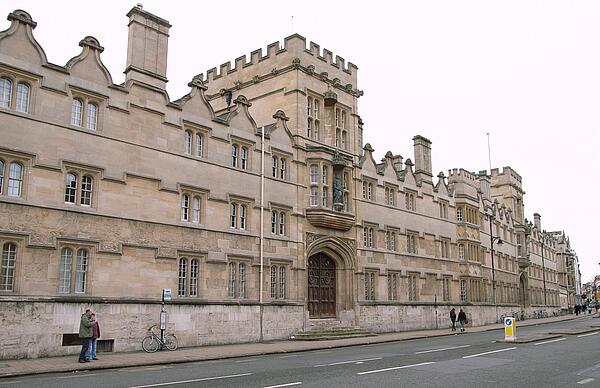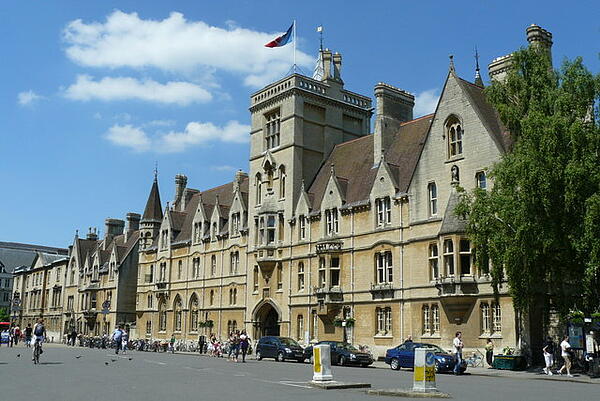Medieval Colleges at Oxford
The medieval colleges of Oxford were the first of their kind in the English-speaking world. Although there is no clear foundation date for the university, teaching in the city existed from as early as 1096.
As the teaching became more well known and respected across the country, monastic halls were chosen to be used as the first academic houses and more structured teaching began. However, it wasn’t until the 13th Century when the first colleges were officially founded. These colleges were Balliol, University College and Merton, which were all established between 1249 and 1264.

Balliol
The precise date on which Balliol was founded is heavily disputed, but there is evidence that there were students learning under that college name by June 1266. Specifically, records suggest that John I de Balliol took an oath in the 1260s “to provide perpetual maintenance for poor scholars in the university”, which is believed to have been the catalyst for the creation of a college in his name.
Following his death, John’s widow Dervorguilla established permanent endowment for the College in 1282, as well as its first formal statutes.
The first few years of the college’s existence lacked in organisation and facilities, and students were left to fend for themselves in small groups based in local lodging houses and inns. However, it was from these small groups that the modern university’s association of autonomous colleges evolved.
University College
University College owes its existence to William of Durham, who died in 1249. William stated in his will that 310 marks, which was a large amount of money, should be invested in rents to support Oxford scholar. The large house rented by the Masters with this money still survives today and is known as Great University Hall.
After receiving funding from William, the college grew and grew, and in 1311 it was given autonomy to run itself. Over time, University College gradually became richer thanks to the money gained via the rental of the property purchased in Oxford, and this allowed it to continue investing in property until it became one of the wealthiest colleges in the country.
Merton
Walter de Merton was responsible for founding Merton college after deciding he wanted to invest his wealth in an education centre in Oxford. Initially, he gifted his large estate in Malden, Surrey to his eight scholarly nephews in 1263, who were all studying at Oxford. However, soon afterwards asked permission from King Henry II to relocated the scholars from Surrey to Oxford. Once this permission was granted (in 1264) the students were moved and began studying Theology in Oxford.
Overseen by a warden, Merton’s eight nephews all received an annual income and were initially the only students at the college. The numbers quickly grew to 20, but they were all members of Merton’s family.
When local conflict began in Oxford, Walter chose to found a college at Cambridge, expecting all scholars to move to escape the violence. However, he also continued to invest in Oxford, and in 1265 he purchased the church of St. John the Baptist and three nearby houses, which would serve as accommodation.
When Walter retired from royal service in 1274, he made some final revisions to the college statutes to ensure it would remain self-governing and so consolidated the community at its present site.
Exeter
Historians struggle to pinpoint the exact date on which Exeter College was founded, but many claim it was 4 April 1314. It was on that day that Walter Stapeldon, Bishop of Exeter, gave the rectory of Gwinear in Cornwall to the Dean and Chapter of Exeter to provide support for twelve scholars at Stapeldon Hall.
Just a few months later, he also obtained Hart Hall, which was on the site of the present Hertford College, and provided the scholars with a house to live in. The following year the site was changed for St. Stephen’s Hall, which occupied part of the present college area. This hall became known as Stapledon Hall and the rent gained from Hart Hall was dedicated to its upkeep.
Initially, only people living in the diocese of Exeter were allowed to study at Exeter College, the only exception being the chaplain who was nominated by the Dean and Chapter of Exeter. However, this did eventually change, beginning with an offering of places to people from across Deveon, and then stretching further afield. All of the students initially enrolled at the college studied the arts.
The college was initially small and poor, consisting of just a Rector, Chaplain and 12 to 14 fellows, all in holy orders. It wasn’t until the late fifteenth century when a few rooms were offered to students.
See also:

MLA Citation/Reference
"Medieval Colleges at Oxford". HistoryLearning.com. 2025. Web.
